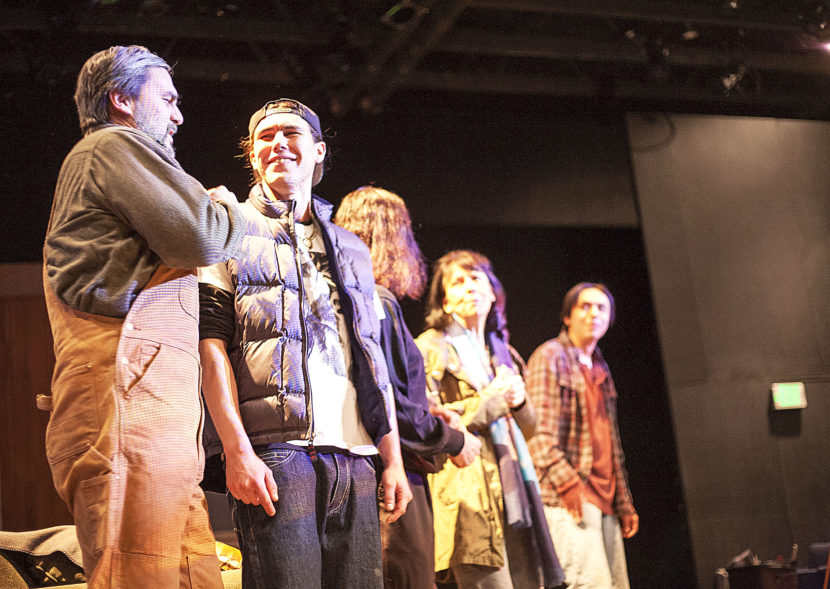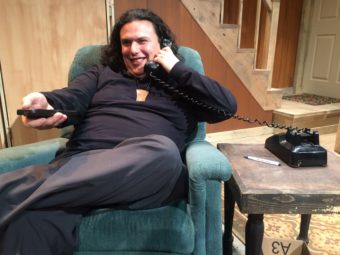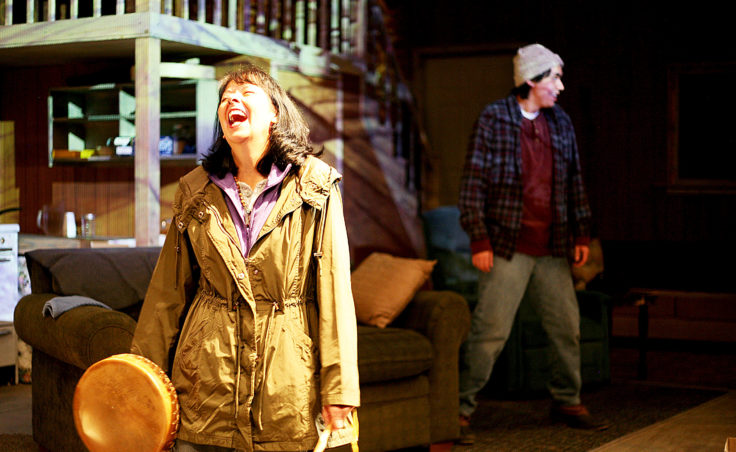“They Don’t Talk Back” opens at Perseverance Theatre tonight (Friday, Jan. 27). Among other themes, it’s a play about family, identity, colonization and cultural preservation. It features three generations of Tlingit men in Southeast Alaska facing change. And it’s also a love story.

The diversity of themes is supported by a diverse cast and director composed of Tlingit, Cherokee, Athabascan, Yup’ik and Choctaw people.
Tonight’s opening at 7:30 is part of what is being described as a rolling world premiere that began in California, and is in collaboration with Native Voices at the Autry and La Jolla Playhouse.
It’s also a homecoming for the playwright, Juneau theater artist Frank Henry Kaash Katasse.
The play opens with Paul Senior on a second floor balcony of a modest home with mismatched and worn furniture.
Paul Senior, played by Juneau actor and Tlingit Jake Waid, is a gruff fisherman who wears Carhart overalls and is the patriarch of the story. He’s reciting a poem in Tlingit that playwright Frank Henry Kaash Katasse would call one of the play’s interludes — poems, songs and monologues woven throughout the play’s story line.
Ironically, Katasse wrote the interludes during interludes.
“I worked at KTOO for quite some time and I’d finish work at 4:30 and my wife finished work at 5. So, sometimes I’d have a half an hour before I had to go pick her up,” Katasse said. “So what do you do for a half an hour? You can dink around on your phone, or you can work.”
Katasse hadn’t written a full-length play before, and he wasn’t trying to at the time.
“My intention was to write things that were inspiring me,” Katasse said. “One of the monologues I wrote was because I wanted an audition piece as an actor … As a matter of fact all the parts are parts I would love to act.”
Katasse also is an accomplished actor — readers may have seen him in Perseverance’s “Chicago,” or “Our Voices Will Be Heard” among others.
He’s also the board president of the Juneau Douglas Little Theatre.
And what inspired the 30-minute writing sessions?
“It was rainy one day so I write this monologue about rain and how it refreshes you,” Katasse said.
The rain interlude is now performed by actor Brian Wescott who is Athabascan and Yup’ik, and plays both a minister and Paul Senior’s son, who is a Desert Storm veteran. He’s also the estranged father of Nick, played by Skyler Ray-Benson Davis, who is Tlingit.
“After a while I had this short story about a young man (who eventually became Nick) going to live with his grandparents,” Katasse said.
He thinks the short story was called “City Boy.”
“Then I realized I could take this story and weave it through the rest of these interludes,” he said. “I could tie this story to all these different characters.”
Nick’s counterpart is his raised-in-the-village cousin Edward, played by Kholan Studi.
Katasse said both Tlingit characters represent parts of himself.
“Back in the day it was very affordable to take your family and go tour Southeast Alaska on the ferry,” Katasse said. “We would do that when I was little. And my dad was a commercial fisherman so sometimes he’d be fishing out of Petersburg, or Wrangell, or Sitka. And we’d go meet him there on the ferry.”
“So I have these vivid memories of us being little in some of these communities, and some of the experiences I had from being the city boy from the big town of Juneau,” he said.
Nick is sent to live with his grandparents, Paul Senior and Linda (played by Diane E. Benson, who is Tlingit), and Edward in the village while his mother awaits trial for drug-related charges in Juneau.
The following scene exemplifies Nick’s angst.
“Hey cousin, want to grab the skiff and go check on the crab pots?” Edward asks.
“No, I don’t want to check the f—ing crab pots, cousin! I’m sick of this place. Maybe dad had the right idea — get as far away from you as possible — get away before I end up as f—ed up as you!” answers Nick.
Drama like this is often balanced with comedy, and a diverse selection of music including a church song.
Katasse brought jazz musician and friend Ed Littlefield onto the team as a composer and Tlingit Language Consultant.

“One of the reasons you break into a song during a musical is that the character reaches an emotional boiling point, and the best way to express that is through song,” Katasse said. At one point Nick raps — another one of Katasse’s interludes. (Clink on the audio player above to hear it).
Beyond coming of age the cousins experience, and change everyone faces, it’s also a love story between the grandparents. Paul Senior and Linda play the kind of long-time in-love lovers to which many aspire.

